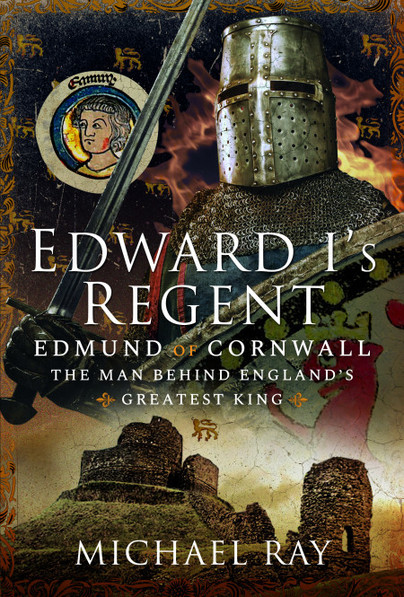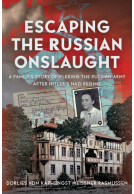Edward I and Wales, 1254-1307 (Hardback)
Imprint: Pen & Sword History
Pages: 256
Illustrations: 30 black and white illustrations
ISBN: 9781526776419
Published: 18th June 2021
Review!
Video review by Dr Alexander Clarke
(click here for international delivery rates)
Order within the next 3 hours, 24 minutes to get your order processed the next working day!
Need a currency converter? Check XE.com for live rates
| Other formats available - Buy the Hardback and get the eBook for £1.99! | Price |
|---|---|
| Edward I and Wales, 1254-1307 ePub (5.3 MB) Add to Basket | £6.99 |
The late 13th century witnessed the conquest of Wales after two hundred years of conflict between Welsh princes and the English crown. In 1282 Llywelyn ap Gruffudd, the only native Prince of Wales to be formally acknowledged by a King of England, was slain by English forces. His brother Dafydd continued the fight, but was eventually captured and executed. Further revolts followed under Rhys ap Maredudd, a former crown ally, and Madog ap Llywelyn, a kinsman of the defeated lords of Gwynedd.
The Welsh wars were a massive undertaking for the crown, and required the mobilisation of all resources. Edward’s willingness to direct the combined power of the English state and church against the Prince of Wales, to an unprecedented degree, resulted in a victory that had eluded all of his predecessors.
This latest study of the Welsh wars of Edward I will draw upon previously untranslated archive material, allowing a fresh insight into military and political events. Edward’s personal relationship with Welsh leaders is also reconsidered. Traditionally, the conquest is dated to the fall of Llywelyn in December 1282, but this book will argue that Edward was not truly the master of Wales until 1294. In the years between those two dates he broke the power of the great Marcher lords and crushed two further large-scale revolts against crown authority.
After 1294 he was able to exploit Welsh manpower on a massive scale. His successors followed the same policy during the Scottish wars and the Hundred Years War. Edward enjoyed considerable support among the ‘uchelwyr’ or Welsh gentry class, many of whom served him as diplomats and spies as well as military captains. This aspect of the king’s complex relationship with the Welsh will also feature.
As featured in
Battlefield - The Magazine of the Battlefields Trust and the Scottish Battlefields Trust - Volume 28, Issue 1, Autumn 2023
This book looks at Edward I and his suppression of the Welsh kingdom in the 13th Century, not only was he able to crush the will of the Welsh people, he was also able to control the Welsh lords & leaders. One of the problems with Welsh history is that it can be underplayed and less understood, which is why there is still animosity between the two still today. But this book has been written very well in that it’s not stuffy and dry, but actually informative and easy to read. Having read a couple of other books written by the same author David Pilling, he seems to be able to sort out the complication and turn it into an easy-to-read passage, which can help greatly on a subject like this when you have Welsh names and placenames interspersed throughout. A good read and one I think many interested in this subject would enjoy.
The History Fella
Read the full review here
David Pilling's second book may prove to be an essential guide to Edward I's campaigns in Wales during the late 13th century. Mr. Pilling has covered almost everything in this objective and fascinating study. Everything from political relations with Wales both before and after the campaigns, the background and context, to logistics, strategy and troop movements.
NetGalley, Joanna Arman
He also explores the legacy and aftermath of the conquest of Wales, and the building of the great castles which stand to this day. in the course of the narrative, he challenges some popular wisdom (James of St George did not "build" the castles. They weren't resented as much at the time). I found it fascinating that laws regarding female inheritance were more restrictive in some parts of Wales, when many people say Welsh law was "ahead of its time".
The other great thing about this book is that you actually want to keep reading. Its scholarly and packed full of information, but not dry or dull as proverbial dishwater. It is a worthy sucessor to Pilling's previous work on the Montofortian rebels of Henry III's reign. Maybe he will write a study of Edward's campaigns in Scotland next?
"It is an interesting read and is both well researched and written."
Clwyd FHS
Click here to watch
Video review by Dr Alexander Clarke
Fantastically detailed account of Edward I and his campaigns in Wales. Definitely a must-read for those with an interest in the people and places of that time.
NetGalley, Sarah Mueller
Well researched account of Edward I in Wales that is well written and interesting for a reader who likes historical accounts and battles.
NetGalley, Samantha Hehr
Featured in
Mortimer Matters, the magazine of the Mortimer History Society, July 2021
As seen in Inside Flintshire Magazine
Flintshire Magazine
Rating: 5 out of 5 stars
NetGalley, Rebecca Hill
I got to know Edward I and Llewellyn through Sharon Kay Penman years ago, and I am a bit more sympathetic to Llewellyn in this book than the author was.
Overall, this was a fabulous read! I enjoyed the breakdown of the military maneuvers, as well as the dedication that Edward I took in subduing Wales. He was more determined than his predecessors, and it showed through the steps and efforts that he took.
The author did a great job with the materials, and breaks it down in an easy to read piece that readers will enjoy and connect with.
A well written, informative historical account.
NetGalley, Rebecca Sims
I enjoyed reading this book, it was very interesting and informative.
I've never read a history specifically about how England took control of Wales. It's been something that I've known about for a while, but I never read a book just about it. It's a fascinating topic and makes me remember how Welsh people, to this day, hate the English and resent the colonization that took place in Wales. A language decimated, a people pushed down and forced to conform. But, this is a fascinating read that I would like on my shelf one day.
NetGalley, Caidyn Young
About David Pilling
David Pilling is a self-employed author and historian based in West Wales, where he was raised on a smallholding. As a child he acquired a love for the Welsh countryside and Welsh history, especially the medieval era. His particular interests lie in the Edwardian wars of the late 13th century. He is the author of Rebellion Against Henry III and Edward I and Wales, 1254-1307, this is his third book for Pen and Sword.
Born on this day - Edward I
17th June 1239
Edward was known for his temperamental personality and despite periods of unpopularity was respected by his subjects as the embodiment of a medieval king and a man of faith.
Edward I's Regent Edmund of Cornwall, The Man Behind England’s Greatest King (Hardback)
Born at Christmas 1249 to Richard, Edmund of Cornwall was nephew to Henry III and cousin to Edward I. His eventful childhood took him to Germany when his father was elected king there. He was captured at the Battle of Lewes and imprisoned for more than a year. Returning from crusade, he witnessed the brutal murder of his half-brother, which left him as heir to his father, the richest man in the kingdom. Throughout his life, Edmund played a crucial role in medieval England. As Regent of England, Earl of Cornwall and the richest man in the land, he was a leading force of the late-thirteenth century.…
By Michael RayClick here to buy both titles for £50.00

















